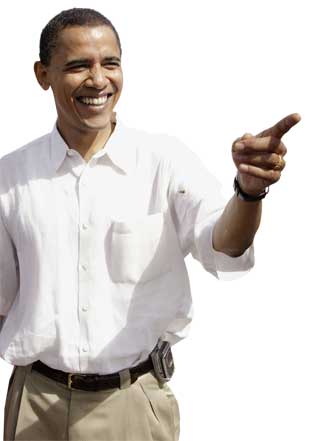美国选举出来的总统并不是马上宣誓就职,Obama要等到何时才能正式上任呢?为什么要等这么久?这里的历史背景是什么?可有法律依据?这段时间当选总统(president-elect)该忙些什么?总统宣誓的时候该说什么?就职当天有什么活动?你知道05年Bush就职的时候就职典礼花了多少钱吗?
By Marshall Brain, HowStuffWorks.com | McClatchy-Tribune
November 6, 2008
With the election over and Barack Obama chosen as the next president, we enter an odd (奇怪的) period of time. For the 2½ months between the Nov. 4 election and the Jan. 20 inauguration (就职典礼), we wait for the new president to assume his office (assume one's office 就职). Meanwhile, the lame-duck (即将去职的官员) president retains power, and will officially be the one who handles any crisis that arises in the interim (过渡时期).
Why do we have this delay? What happens during the delay? And what occurs on inauguration day to transfer power from the old president to the new?
The reason for the delay is interesting. Originally, the delay was much longer. According to the 12th Amendment to the U.S. constitution (宪法) (ratified 批准 in 1804), the president was not inaugurated (使......宣誓就职) until March 4. This period of time was necessary so that the electoral college (选举团) could meet and deliberate (商讨,仔细考虑), so that the news could travel, and so that the new president could make his way to the capital. Remember that in the 1800s everything was being done with horse power and roads were fairly rare. Picking up your family and moving was somewhat more arduous (艰难的,艰难的) than it is today.
By the early 20th century, it became clear that four months was no longer necessary. But time was still needed for the electoral college vote, which occurs on Dec. 15. The 20th amendment (修正案) moved inauguration day to Jan. 20. This amendment also specifies (详细说明) what will happen if the president dies between his election and his inauguration.
The delay does provide the new president with some breathing room. He needs to select his cabinet (内阁) for example, as well as important positions like the chief of staff. There are hundreds of other high-level appointments that need to be made. And these people need time to come up to speed. The successors (接任者) meet with their predecessors (前任) to transfer information.
Because of the economic crisis under way and the number of new programs that are trying to address (从事,忙于) the crisis, the new president's choice of treasury (财政部) secretary will be key, along with the choice of the secretary's team. There is a great deal of information that needs to transfer. Similarly, the new secretary of state will be taking over dozens of high-level diplomatic relationships, and that takes time.
The outgoing (即将离职的) president is not sitting on his hands during the transition. It is tradition for the outgoing president to use his remaining time in office for policy changes and pardons (赦免). For example, former President Clinton pardoned 140 people as he left office. President Bush will grant his share of pardons, and he is said to have a number of policy changes in his sights.
Finally Jan. 20th arrives. The actual transfer of power occurs at noon on that day, when the new president recites his oath (誓言,宣誓) of office:
"I do solemnly (严肃地,庄严地) swear that I will faithfully execute the office of President of the United States, and will to the best of my ability, preserve, protect, and defend the Constitution of the United States."
With that single sentence, the new president takes power (取得政权). The vice president is sworn in (be sworn in 宣誓就职) just before the president with a similar oath.
The oath takes perhaps a minute, but the rest of the day is filled with events. Prior to the oath there is a parade (阅兵;游行) that takes the old and the new president to the ceremony. After the oath, the new president delivers his inaugural address (就职演说). Some of these addresses are short, some are long, but the goal is to allow the new president to set a direction and a tone for the country.
After the address there is a luncheon (午宴) at the U.S. Capital to welcome the new president. Then another parade. And then there is a night of parties known as the Inaugural Ball (舞会). The Ball has a long tradition going back to 1809. It has always been a big event. It is estimated that the bill for all of the inauguration activities in 2005 may have topped $40 million, paid for mostly with corporate donations. Thousands of people attended.
At the end of the day, the new president is no doubt exhausted. He and his family make their way to the White House for their first night in their new residence.
For more information, please go to http://www.bingoenglish.com/content/html/news/200811/15-23.html.
本期总统就职相关词汇:
inauguration (就职典礼)
assume his office (assume one's office 就职
the lame-duck (即将去职的官员) president
in the interim (过渡时期)
the U.S. constitution (宪法) (ratified 批准 in 1804)
be inaugurated (使......宣誓就职)
the electoral college (选举团)
the 20th amendment (修正案)
select his cabinet (内阁)
The successors (接任者) meet with their predecessors (前任) to transfer information.
the new president's choice of treasury (财政部) secretary will be key
the outgoing (即将离职的)
during the transition
pardon (赦免)
recites his oath (誓言,宣誓) of office
takes power (取得政权
inaugural address (就职演说)
be sworn in 宣誓就职
parade (阅兵;游行) , luncheon (午宴),ball (舞会).
electoral college: a body of electors chosen to elect the President and Vice President of the United States.
总统选举团:美国参加选举总统和副总统的选举团


